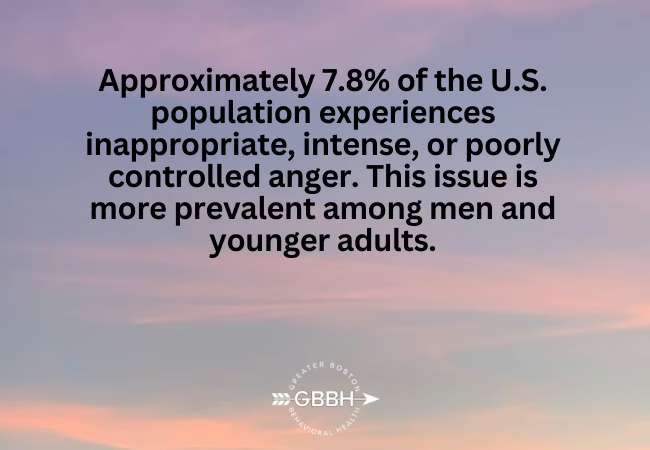Anger is a normal and healthy emotion when expressed appropriately. However, when anger remains unresolved or uncontrolled, it can have serious consequences on mental health, relationships, and overall well-being. Unmanaged anger can contribute to stress, anxiety, depression, and even physical health issues, making it critical to recognize the signs and seek appropriate help.
Anger is a natural emotion that everyone experiences. However, when anger is left unresolved or mismanaged, it can have serious consequences on mental and physical well-being. Unchecked anger can lead to stress, anxiety, depression, and even chronic health conditions.
Recognizing the signs of unresolved anger and seeking appropriate support, such as an Anger Management Program, is crucial for maintaining mental health.
This guide explores how unresolved anger affects mental health, common signs that indicate a need for help, and the best treatment options available.
The Psychological Toll of Unresolved Anger
When anger is not properly addressed, it can lead to significant psychological distress. People who suppress or ignore their anger often experience heightened levels of stress, which can manifest as irritability, mood swings, or feelings of hopelessness. Over time, unresolved anger can contribute to more severe mental health disorders, including anxiety and depression.
The Connection between Anger and Mental Health Disorders
- Anxiety and Stress: Chronic anger keeps the body in a constant state of stress, increasing cortisol levels and making individuals more susceptible to anxiety.
- Depression: Bottled-up anger can turn inward, leading to feelings of worthlessness and self-doubt, common symptoms of depression.
- Substance Abuse: Many individuals struggling with unresolved anger turn to alcohol or drugs as coping mechanisms, making Anger Management in Recovery essential for those overcoming addiction.
- Relationship Problems: Persistent anger can harm relationships with family, friends, and colleagues, leading to isolation and loneliness.
- Physical Health Issues: Anger has been linked to high blood pressure, heart disease, and weakened immune function.
Recognizing the Signs of Unresolved Anger
Anger manifests in different ways. Some individuals lash out aggressively, while others bottle up emotions and experience internal distress. Here are some key warning signs that indicate unresolved anger may be affecting mental health:
1. Frequent Irritability or Frustration
- Becoming easily annoyed by minor inconveniences.
- Reacting disproportionately to small problems.
- Feeling on edge or tense most of the time.
2. Physical Symptoms of Anger
- Tightening of the jaw, clenched fists, or rapid heartbeat.
- Headaches or muscle tension from prolonged stress.
- Difficulty sleeping due to racing thoughts or lingering frustration.
3. Passive-Aggressive Behavior
- Silent treatment, sarcasm, or subtle digs instead of direct communication.
- Avoiding confrontation while still holding resentment.
- Engaging in manipulative or controlling behaviors.
4. Outbursts or Emotional Explosions
- Yelling, shouting, or breaking objects during arguments.
- Difficulty calming down after conflicts.
- Feeling guilt or regret after reacting aggressively.
5. Suppressing or Ignoring Anger
- Avoiding confrontation at all costs but feeling resentment.
- Feeling emotionally detached or disconnected.
- Experiencing unexplained sadness or fatigue.
Recognizing these red flags is the first step toward seeking anger management treatment and learning healthier emotional regulation strategies.
How Unresolved Anger Affects Mental Health
When anger is not properly addressed, it can become chronic and destructive. Bottled-up emotions, frequent outbursts, or suppressed frustration can lead to various mental and emotional challenges, including:
1. Increased Stress and Anxiety
Holding onto anger creates high levels of chronic stress, which can lead to:
- Constant irritability and frustration over small issues.
- Increased anxiety and restlessness, making it difficult to relax.
- Overreaction to minor inconveniences, causing tension in relationships.
Chronic anger causes the body to remain in a state of heightened alert, similar to fight-or-flight mode, which keeps stress hormones elevated and negatively impacts mental health.
2. Higher Risk of Depression
Research has shown that unresolved anger is linked to depression, especially in individuals who suppress their emotions.
- Anger turned inward can lead to feelings of guilt, self-blame, and hopelessness.
- Individuals may struggle with low self-esteem and emotional numbness.
- Suppressed anger can cause withdrawal from relationships and social activities.
Anger management programs help individuals recognize destructive thought patterns and develop healthier coping strategies to prevent depression from worsening.
3. Difficulty in Relationships
Uncontrolled anger often results in strained personal and professional relationships due to:
- Explosive outbursts that cause emotional harm to loved ones.
- Passive-aggressive behaviors that create long-term resentment.
- Inability to communicate frustrations effectively, leading to misunderstandings.
People struggling with anger management in recovery often find that learning effective communication skills through therapy helps rebuild trust and strengthen relationships.
4. Impulsive or Aggressive Behavior
Individuals who struggle with anger regulation may exhibit impulsive reactions such as:
- Yelling or verbal aggression during conflicts.
- Physical aggression or reckless behavior.
- Destructive coping mechanisms, such as substance abuse.
Incorporating CBT Therapy and DBT Therapy into mental health treatment programs can help individuals develop mindfulness, distress tolerance, and healthier emotional responses.
5. Increased Risk of Substance Abuse
Many individuals with unresolved anger turn to drugs or alcohol as a way to cope.
- Anger and addiction are closely linked, as individuals may use substances to numb intense emotions.
- Substance use disorders worsen anger issues, leading to a destructive cycle of emotional instability.
- Behavioral health programs in Boston offer dual diagnosis treatment for individuals struggling with both anger and substance abuse.
There are several evidence-based treatment programs designed to help individuals cope with unresolved anger and improve emotional regulation. Some of the most effective approaches include:
CBT Therapy (Cognitive Behavioral Therapy)
CBT is a widely used technique that helps individuals identify and change negative thought patterns that contribute to anger. By recognizing triggers and developing healthier coping mechanisms, CBT therapy can significantly reduce anger-related issues.
DBT Therapy (Dialectical Behavior Therapy)
DBT is extremely beneficial for people who suffer with extreme feelings. It combines mindfulness, emotional regulation, distress tolerance, and interpersonal effectiveness skills to help people manage their anger constructively.
Anger Management Programs
Enrolling in an anger management program provides individuals with the tools to understand their anger, learn coping strategies, and communicate effectively. These programs can be beneficial for those struggling with chronic anger or individuals in recovery from substance abuse.
Mental Health Treatment Programs
Comprehensive Mental Health Treatment Programs offer a holistic approach to managing unresolved anger. These programs often include therapy, medication management, and lifestyle modifications to improve overall well-being.
Seeking Help for Unresolved Anger
If unresolved anger is affecting your mental health, relationships, or daily life, it’s essential to seek professional help. A specialized Mental Health Treatment Center in Boston can provide tailored support and therapeutic interventions to help individuals regain emotional balance.
Greater Boston Behavioral Health: Your Partner in Mental Wellness
At Greater Boston Behavioral Health, we understand the impact unresolved anger can have on mental and emotional well-being. Our team of experts offers a range of treatments, including CBT therapy, DBT therapy, and comprehensive Mental Health Treatment Programs, to help individuals regain control over their emotions. If you or a loved one is struggling with anger issues, contact us today to start your journey toward better mental health. Unresolved anger doesn’t have to control your life. With the right support and guidance, you can learn to manage your emotions effectively and improve your overall well-being. Call (617) 307-3842 to speak with a professional about our anger management programs and mental health therapy services in Boston.
FAQ on Anger Impacts Mental Health
How does unresolved anger affect mental health?
Unresolved anger can lead to chronic stress, anxiety, depression, and difficulties in relationships. It may also contribute to impulsive behaviors, substance abuse, and physical health issues such as high blood pressure and heart disease.
What are the signs that anger is negatively affecting my life?
Common signs include:
- Frequent irritability or frustration over small issues.
- Outbursts of rage, verbal aggression, or physical reactions.
- Passive-aggressive behaviors, resentment, or avoiding confrontation.
- Increased stress, anxiety, or feelings of guilt after angry episodes.
- Strained relationships due to conflict or difficulty communicating emotions.
How can I manage my anger in a healthy way?
Effective anger management techniques include:
- Practicing deep breathing and relaxation exercises.
- Engaging in physical activities like exercise or yoga.
- Using Cognitive Behavioral Therapy (CBT) or Dialectical Behavior Therapy (DBT) to reframe thoughts.
- Participating in anger management programs or support groups.
What types of therapy are available for anger management?
At Greater Boston Behavioral Health, we offer:
- CBT Therapy to identify and change negative thought patterns.
- DBT Therapy to develop emotional regulation and mindfulness skills.
- Anger management programs to teach coping strategies.
- Group therapy to provide peer support and shared learning experiences.
When should I seek professional help for my anger?
You should seek help if your anger is:
- Causing problems in relationships, work, or daily life.
- Leading to impulsive actions or aggressive behavior.
- Negatively affecting your mental or physical health.
- Preventing you from managing stress in a healthy way.


